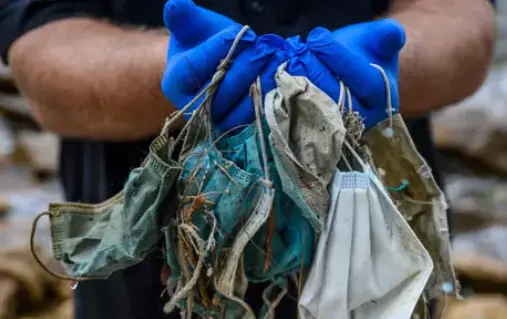
Photo via screen capture/The Guardian
As the coronavirus situation unfolded in 2020, the world has continued to “mask up” with each passing month, as PPE (personal protection equipment) was distributed to everyone from healthcare workers to everyday people and even mandated throughout a majority of U.S. states.
It was a reality few saw coming, but one that quickly became commonplace: more than 8 in 10 U.S. adults, or 85% altogether, said they now wear masks “all or most of the time” according to an August poll conducted by the Pew Research Center, up from 65% in June.
While the masks have been praised, and deemed “essential” (although not all workers have been) by government officials, there is at least one major downside to their usage that has gone mostly unnoticed: the potentially serious effects these masks could be having on the environment as a whole, especially considering the staggering amount of plastic waste they have contributed to oceans in just the past year alone.
Recently, a conservation organization based out of Asia released a report detailing the extent of this contamination, and the results are a wake-up call for anyone who may be concerned with plastic buildup in our oceans.
Report: An Estimated 1.56 Billion Face Masks Entered Oceans in 2020
According to a report from the Hong Kong-based conservation organization OceansAsia, about 1.56 billion face masks entered ocean ecosystems worldwide over the course of 2020, adding an additional 4,680 to 6,240 metric tons of marine plastic pollution to the world’s waters.
“The 1.56 billion face masks likely to enter our oceans in 2020 are just the tip of the iceberg,” says Dr. Teale Phelps Bondaroff, Director of Research for Oceans-Asia, and lead author of the report, titled ‘”Masks on the Beach:” The Impact of COVID-19 on Marine Plastic Pollution.’
“The 4,680 to 6,240 metric tons of face masks are just a small fraction of the 8 to 12 million metric tons of plastic that enter our oceans each year,” Dr. Bondaroff added.
Adding to the concern is the time that these masks take to break down in the environment. This past summer, conservationists warned that there may one day be more masks than jellyfish in the sea, and these products stick around for centuries.
“These masks will take as long as 450 years to break down, slowly turning into micro plastics while negatively impacting marine wildlife and ecosystems,” OceansAsia states on its website, which includes a six-minute video presentation of its findings.
According to Gary Stokes, the operations director of OceansAsia, one of the biggest risks to masks in the ocean is that sea life, especially predators, may mistake them for a meal.
“Back in February when we were out doing our marine debris studies, we started to find single-use masks washing up on mass,” he says in the video. “This was six weeks after the general population started to use them.
“Single use masks like this one are made of a spun polypropylene, this is a plastic, and like most plastics it breaks down into smaller and smaller plastics known as microplastics, and these microplastics are going to be in this marine environment for the next 3-400 years, and that’s where the problem arises.”
As the world continues to use more and more masks, and officials like Dr. Anthony Fauci of the CDC say that we may need to continue wearing them for an undetermined length of time, the question of whether or not these plastic masks are worth it persists, in light of the growing amount of marine pollution that is being uncovered.
“The more of these masks that we are using, the bigger the load we are putting on the environment, for future generations that will have to deal with this,” Stokes said.
For information from Stokes and OceansAsia, check out the full video. You can also learn more or purchase a microplastic-free seal salt here from the company Ava Jane’s Kitchen.
Related Reading: Doctors Warn: Potential Long Term Side Effects of Mask Wearing Include Shortness of Breath, a Weakened Immune System and Chronic Respiratory Conditions
Thanks for installing the Bottom of every post plugin by Corey Salzano. Contact me if you need custom WordPress plugins or website design.




